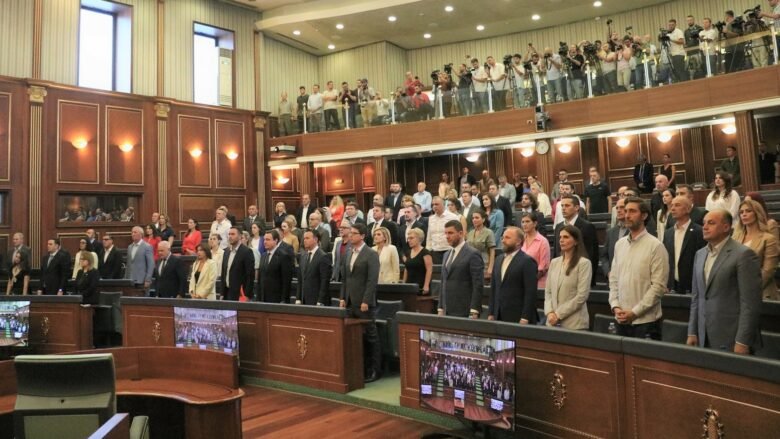Members of the Assembly of Kosovo will return to their seats to continue the constituent session only after the full judgment of the Constitutional Court is officially published on its website.
It has now been two weeks since the attempt to constitute the ninth legislature was suspended following the Constitutional Court’s interim measure, which barred any parliamentary action in this regard until August 8.
According to the Court’s latest ruling issued on August 8, MPs now have 30 days to complete the constitutive process. During this period, the presiding officer of the session may call Assembly meetings every 48 hours, or even more frequently, in an effort to elect the Speaker and Deputy Speakers of the Assembly—a prerequisite for its full functioning—with voting to be conducted openly.
Constitutional law expert Mazllum Baraliu says the new deadline for constituting the Assembly will only begin once three conditions are met:
- Publication of the full judgment by the Constitutional Court.
- Its announcement in the Official Gazette.
- The expiration of the interim measure.
Baraliu believes that the continuation of the 55th session will be called very soon.
From the moment the judgment comes into force, Baraliu explains, the 30-day countdown begins, during which sessions can be convened every 48 hours—or more often—depending on circumstances and technical possibilities. Legally, the official announcement is crucial, as the interim measure remains in effect until this happens.
He stressed the urgency of publishing the decision in the Official Gazette:
“Once the judgment is published in full, announced in the Official Gazette, and the interim measure expires, the new 30-day period begins. Within that period, Assembly members can proceed with decisions and actions to constitute the legislature. The Constitutional Court has stated the interim measure continues until the decision is officially announced. Once published, the countdown starts, and 48-hour deadlines also begin—sessions could even happen every few hours if needed. I believe the decision will appear in the Gazette very soon because this is an urgent matter,” Baraliu told KosovaPress.
Meanwhile, political analyst Shemsi Jashari argues that the initial actions of the winning party, Vetëvendosje (VV), suggest a lack of readiness to implement the Constitutional Court’s decision. He says VV must reflect, especially after this ruling:
“The Court clearly outlined the procedure for constituting the Assembly. No political party—especially VV—if it does not intend to undermine our democratic system or harm the state of Kosovo, should refuse to comply. This third 30-day extension should be used to form institutions and move forward. Their coordinated reaction yesterday, including official statements attacking the Court, is concerning.”
Jashari added that VV’s early reactions were skeptical and uncooperative, hinting at a possible refusal to follow the mandated process:
“Initial reactions suggest VV is unwilling to implement a binding ruling. They consistently attack the judiciary whenever decisions do not suit them. It remains to be seen how they will act, but disappointment with their first responses is becoming the norm.”
Lawyer Ardian Bajraktari notes that the latest ruling, published on August 8, is clearer than the previous one, particularly in clarifying that the technical chairperson acted in violation of both the Constitution and Assembly Rules of Procedure.
He emphasizes that the winning party’s right to nominate a candidate is not absolute but limited, and calls for political reflection to resolve the deadlock.
Bajraktari also reminds that Constitutional Court rulings are binding:
“While there can be discussions about the content of rulings, they must ultimately be implemented. Any failure to do so would be extremely concerning.”
On August 8, the Constitutional Court ruled that the Speaker of the Assembly must be elected by open vote, that a single candidate can only be voted on three times, and that the ninth legislature must be constituted within 30 days.
The Court also declared that MPs failed to implement its June 26, 2025 judgment, rendering all sessions held between June 27 and July 26, 2025, invalid.
Finally, the decision makes clear that all MPs must be present and vote during the election of the Speaker and Deputy Speakers of the Assembly.







